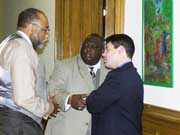Funding for Lincoln Center, a project composed of a community center and six affordable housing units, was canceled at Wednesday’s City Council meeting.
Taking the legal advice of Corporation Counsel Alex Booth, the council passed a 6-2-1 vote in favor of canceling funding allocated to Lincoln Center and re-allocating it for the Wilkinson/Bayview Project and the Urban League-Project Reclaim.
The $540,000 grant dates back to February 2000, when Reverend Tyrone Chess spearheaded the campaign to rehabilitate 513 Communipaw Ave. and construct a community center with affordable housing next door. At that time, Chess was a community relations specialist under Bret Schundler’s administration, a paid position in the mayor’s office.
The new administration found flaws with the contract, though, saying that, in fact, it was not a contract at all. “There is no written contract,” Booth said. He said they signed documents that weren’t completely filled in. The discrepancy over whether or not the contract is legitimate boiled down to a section referred to as “attachment A.” According to Booth, this section, which requested specific information about the project’s scope, cost and expected completion, had not been filled in. “It could be corrected, but this administration has chosen not to do it,” Booth said.
Chess argued that the details being requested were provided on different submissions and were well known in advance. Booth said that the contract’s last-minute execution before Schundler left office most likely caused the error to occur. “The clock wound down on the 29th of June,” Booth said. He added that Dorice Toon-Bell, director of the Division of Community Relations, had notified Chess previously about the incomplete application.
In addition to the controversy over the existence of a legitimate contract, the resolution passed by the City Council also addressed an “appearance of a conflict of interest” with the grant since it was given to a city employee. The Department of Housing and Urban Development (HUD) had conducted a preliminary investigation and found no credible evidence of a conflict of interest because neither Chess nor his family was benefiting from the project. But the letter from HUD did request additional information.
Chess pleaded with the council to vote its conscience as he pointed to his congregants sitting on the benches inside the council chambers. According to Chess, he has already spent $37,000 on the project, money largely raised through his congregation’s donations. On top of that, he must pay a monthly mortgage on the property.
“Not one dime is going to my pocket,” Chess said. “I’m certainly trying to help somebody.”
“I think there was a contract,” said Councilman William Gaughan, who voted against the resolution to cancel Chess’ funding and reallocate the money.
“There was a budget, a description of the plan, and a time when it was finished.”
Councilman Jeremiah Healy, a judge, agreed with Gaughan. “Although attachment A and other details were not included,” Healy said, “I believe it was made up for by the original submission.”
Councilman Mariano Vega abstained. Other council people expressed sympathy for Chess’ circumstances and recommended that he reapply for the grant next year. They pointed out that then there would be no issue as to whether the grant posed a conflict of interest. “I think you were taken for a ride by the past administration,” said Councilwoman Mary Donnelly. “I would hope that you would resubmit your application and I would vote for that project.”
The recommendation did not satisfy Chess or his attorney, Kevin McGovern, who said he would file for a breach of contract.
“I don’t think it’s a coincidence that one of the ‘no’ votes tonight came from Judge [Jeremiah] Healy,” McGovern said, implying that a judge would know what constitutes a proper contract.
As a dozen parents and children, congregants of the Holy Ghost Tabernacle Ministries, filtered out of the council chambers, McGovern said, “I think this is a very unfair action. It’s bad for Lincoln Center, it’s bad for the community, it’s bad for Jersey City.”
Antenna worries senior citizens
About 10 residents from Battery View Senior Citizens Housing on Montgomery Street attended the council meeting to complain about the Planning Board’s approval of a cellular phone antennae on the side of the building.
While many antennae appear on the rooftops of buildings throughout the city, residents at Battery View feared that having the antenna mounted on the side of the wall would affect people behind the wall.
The Federal Communications Commission (FCC) has established limits for the amount of radiation electromagnetic instruments can create within a certain distance of people. The expert testimony at the Planning Board meeting was a consultant for the cellular phone company, Nextel, who did not give details about the radiation behind the building.
“The Planning Board has approved dozens of these antennas,” said Bob Cotter, director of the Division of Planning. Cotter said that the expert testimony had said the antenna is unidirectional, therefore casting all radiation forward. He also said that the amount of radiation was half a percent of what the FCC allowed.
Not comfortable with having testimony solely from an applicant, Council President L. Harvey Smith asked Cotter to put a moratorium on passing variances for additional cell phone antennae and to hire a consultant that could give details about the antennae’s effects on the residents.
